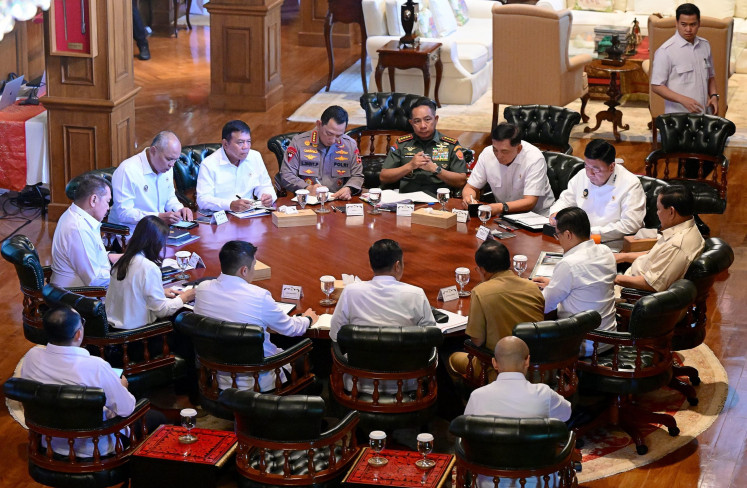Popular Reads
Top Results
Can't find what you're looking for?
View all search resultsPopular Reads
Top Results
Can't find what you're looking for?
View all search resultsThe one who defies Yogyakarta’s king
Handoko (JP/Bambang Muryanto)A man carrying a pile of papers was waiting to meet a young lawyer named Handoko in Yogyakarta
Change text size
Gift Premium Articles
to Anyone
Handoko (JP/Bambang Muryanto)
A man carrying a pile of papers was waiting to meet a young lawyer named Handoko in Yogyakarta. He was hoping Handoko would help him settle a dispute involving his land, which was sold by another person to make way for Yogyakarta’s new airport in Kulon Progo regency.
“I’m sure he will be the brave one [to help me],” said the man. Dealing with land disputes involving the planned airport means dealing with the central government and state airport operator PT Angkasa Pura I, which is backed by those in power and many who are thirsty for infrastructure projects in Indonesia.
Recently, Handoko, 34, has been the talk of the town for his courage, or audacity, depending on how one sees it, to defy the king. The Chinese-Indonesian filed a lawsuit in September 2017 against Yogyakarta Governor Sri Sultan Hamengku Buwono X, who is also the sultan of Yogyakarta. At the crux of his lawsuit is a 1975 deputy gubernatorial instruction containing rules hampering “non-indigenous” Indonesian citizens from owning land in Yogyakarta.
The Yogyakarta District Court refused to try his case in February. Handoko had expected the outcome, and although he tried to smile after the hearing, the disappoinment on his face was apparent.
He has submitted an appeal to the Yogyakarta High Court to contest the lower court’s decision that says the 1975 instruction is correct. Handoko thought the decision was hasty, because it did not consider the opinion of the legal expert he proposed, Nimatul Huda, a state administrative legal scholar from Indonesian Islamic University (UII).
“There is nothing extraordinary in what I’ve been doing,” Handoko told The Jakarta Post. “In Jakarta, people sue the governors.”
But in Yogyakarta, the governor is the king, so what he has done is considered extraordinary. Few people dare to defy the most powerful man in the Yogyakarta Special Region, a province that has istimewa (special) status in which the governor is not elected. Whoever is the sultan is automatically the governor.
Many people think what Handoko has done is rude. Coupled with the fact that he’s Chinese-Indonesian, many people think his actions are twice as rude.
His actions have made some Chinese-Indonesians in Yogyakarta anxious, as they are afraid it will lead to an anti-Chinese movement.
To make matters more complicated, he is suing the governor on a matter of land, a sensitive topic in Yogyakarta after the implementation of a 2012 law on Yogyakarta’s special region status. Since 2015, the administration has used “special status funds” to make a land inventory called Sultan Ground and Pakualaman Ground. This step has led to land disputes with residents, including Javanese.
Recently, some Yogyakarta residents, including royal family members, began to voice harsh statements against Handoko and others who are openly defying the 1975 instruction.
“Let’s banish them from Yogyakarta if necessary,” said a royal family member, KRT Poerbokusumo, on March 1 in an event to celebrate Yogyakarta’s special status in Ndalem Notoprajan, a neighborhood near the kraton.
The threat did not stop Handoko. He challenged it, asking, “How would they do it? Tie me up and put me in a train away from Yogyakarta?”
The father of one said he was ready to face any risks.
“I dare because I don’t do anything wrong and I follow the legal avenues,” he said.
Handoko was born and raised in Yogyakarta. He said in junior high school he had to face the bullies who made a fuss about his ethnicity. He continued his education in a law school at Parahyangan Catholic University in Bandung, West Java. Upon graduation, he worked for LBH Mawar Saron in Semarang, Central Java, where many of his clients were in the low-income bracket. He returned to Yogyakarta and opened his own legal office in 2015.
He looked up to the legendary Yap Thiam Hien, a human rights lawyer from Aceh, who founded the Foundation of the Indonesian Legal Aid Institute (YLBHI). Handoko said Yap was a fighter against discrimination, the one who changed the article saying the Indonesian president had to be an “original” Indonesian.
“The rumor saying I sued the governor under the order of some Chinese-Indonesian businessmen is not true. I’m not a land [price] speculator. I don’t have any money and the prices of land are astronomical,” he said.
He is doing this because he believes racial discrimination is against Indonesian law. The 2017 lawsuit was actually his third attempt to challenge the discriminatory rule. He filed a review request with the Supreme Court and the State Administrative Court in 2015. He lost all cases.
Willie Sebastian, a Chinese-Indonesian who finds the instruction harmful to him, said he supported Handoko’s effort. “Thanks to him, this effort has attracted more attention nationwide,” he said. Willie said the lawsuit should also serve as a reminder for the Yogyakarta governor that the practice is against the law.
But Handoko’s work encompasses all races. Now he is preparing a lawsuit against the law on Yogyakarta’s special status, especially the articles on lands, which concerns many Yogyakarta residents, Chinese-Indonesians or otherwise. He said the law had the potential to make any land without an ownership certificate become the sultanate’s lands.
“After the implementation of the law, the power has been abusive, just like in medieval times,” he said.










